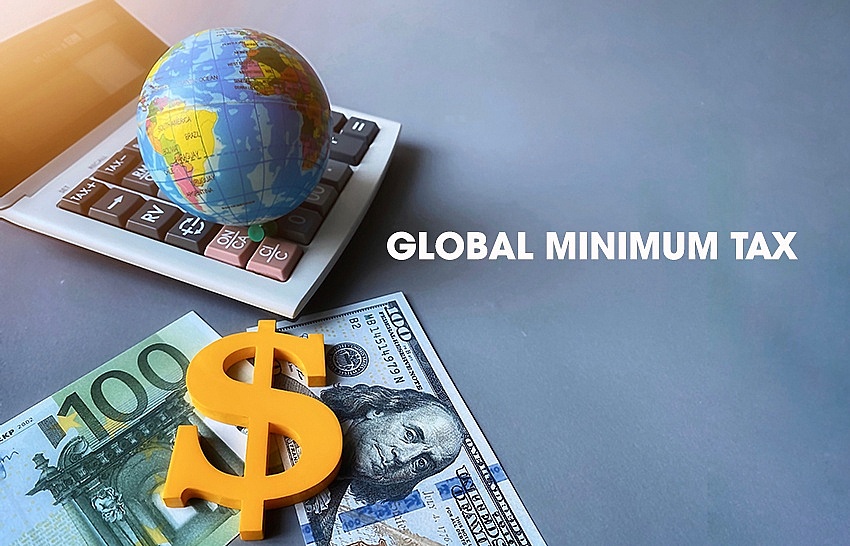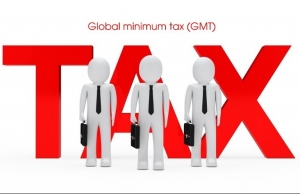Vietnam races to stay competitive with new GMT
Vietnam has been making significant strides in attracting foreign direct investment over the year. However, among many other quarters, Do Nhat Hoang, director general of the Foreign Investment Agency under the Ministry of Planning and Investment (MPI), has raised concerns about the impact of a new worldwide tax on corporates that will enter into force in 2024 and could harm Vietnam’s prospects.
“Despite positive factors such as a significant increase in the number of newly registered projects in 2023, there are signs large corporations are being more cautious and carefully considering their intentions to invest heavily in Vietnam,” Hoang said.
 |
Since mid-last year, foreign financiers in Vietnam have expressed similar concern following the announcement that many countries have decided to implement a global minimum tax (GMT) rate of 15 per cent from 2024. With the application of this tax rate, foreign backers may be required to pay a substantial amount of additional capital to their home countries.
Under the agreement, companies with global revenues of €750 million ($824.5 million) or more will be subject to a GMT rate of 15 per cent. If the effective tax rate enjoyed by the company is lower than 15 per cent in the country of investment, it will have to pay the difference to its home country.
While the agreement is expected to create a level playing field for multinational corporations and reduce tax avoidance, it also poses challenges for countries such as Vietnam, which have been successful in attracting foreign investment with preferential tax rates. With the implementation of a GMT rate, some foreign investors may choose to place their money elsewhere. Dao Thi Thu Huyen, deputy general director of Canon Vietnam, revealed that the company currently provides more than half of the conglomerate’s production output, and one of the reasons why Canon funds large-scale production in Vietnam is to enjoy tax incentives.
However, if Vietnam does not have a timely policy on the application of GMT, the conglomerate may consider allocating production to other production bases with different competitive advantages.
“Should Canon opt to relocate its production to other countries, the repercussions would not be limited solely to Canon Vietnam, but would also impact over 130 other satellite manufacturers,” Huyen said.
The current climate gives rise to authentic concerns, as there are indications that major conglomerates are displaying reticence when making investment decisions in Vietnam. The statistical data on overseas funding attraction since the close of the previous year corroborates this trend.
Urgent measures needed
“Urgent” and “critical” are words frequently used by experts and businesses when discussing the issue of the GMT rate. The story is not just about Vietnam falling behind in the race to attract large corporations, but also losing the right to levy additional taxes. In August of last year, the government established a task force to address the issue. Both the Ministry of Finance and the MPI were tasked by the prime minister to conduct research and formulate appropriate policies. In recent times, a series of conferences and discussions organised by the ministries as well as the National Assembly Committee of Finance and Budget Committee have been held to identify suitable policies.
According to Dang Ngoc Minh, deputy director-general of the General Department of Taxation (GDT), there are currently around 1,015 foreign-invested enterprises in Vietnam whose parent companies fall under the scope of the GMT rate. Upon further review, about 100 businesses are likely to be affected by the GMT rate when it comes into effect in 2024. Major corporations such as Samsung, Intel, LG, Bosch, Sharp, Panasonic, Foxconn, and Pegatron, which are investing heavily in Vietnam, are on the list.
“If all countries with parent companies implement the GMT rate, these countries will collect an estimated additional differential tax of more than VND12 trillion ($511 million) in 2024,” Minh stated.
Deputy Minister of Planning and Investment Nguyen Thi Bich Ngoc pointed out that for the past 35 years, Vietnam has used tax incentives as a vital financial leverage to entice new funding. “Currently, although Vietnam’s corporate income tax (CIT) rate is 20 per cent, higher than the minimum tax rate, it will not be sufficient to address this issue because of the country’s wide range of tax incentives. Urgent measures must be taken to address the GMT rate to minimise its impact on Vietnam’s economy,” Ngoc stated.
Last year, Vietnam issued special incentives, including reduced preferential tax rates of 5-9 per cent. Businesses were also granted tax exemptions or reductions for a certain period, typically exempted for four years and granted a 50 per cent reduction in the following nine years. However, the application of the GMT will render these incentives ineffective.
Experts suggest that Vietnam should proactively exercise its tax authority and continue to create a favourable business environment. Robert King, partner at EY Vietnam, emphasised that Vietnam should prioritise this issue as a country that receives major investment.
At a recent meeting of the National Assembly Standing Committee (NASC), Chairman Vuong Dinh Hue expressed great concern that there had been no proposals related to the GMT issue. He emphasised that the issue is urgent as the GMT will be applied from January 2024 in many places.
Chairman Hue suggested that a pilot resolution should not only address the tip of the iceberg by adjusting what affects the bigger multinationals. Instead, the fundamental issue of reviewing and revising regulations on CIT and incentives should be addressed through decisive amendments to the law.
On the same note, the NASC agreed to amend the law on CIT promptly to respond to the GMT. Vietnam must act decisively to maintain its competitive capacity and ability to attract foreign investment, it said.
Which policy for Vietnam?
During a recent meeting with the GDT, Samsung proposed two policy recommendations aimed at maintaining the capacity of foreign-invested enterprises (FIEs) and their preferential treatment in Vietnam.
Firstly, it suggested establishing support mechanisms to complement and enhance the reduced incentives for FIEs when applying the GMT, depending on their business types. Secondly, Samsung recommended applying a domestic minimum tax mechanism to secure additional tax revenue and finance support schemes.
Choi Joo Ho, general director of Samsung Vietnam, advocated for a cash support mechanism to replace the income tax exemption and reduction for corporations, which will be nullified by the GMT. According to him, this measure would sustain the competitiveness of FIEs in Vietnam and enable them to continue their business operations through reinvestment using the support funds.
He noted that the government would not face any difficulty in mobilising funds or making payments since the support would be disbursed after the companies fulfill their tax obligations and complete the registration procedures.
In addition, several tax experts and advisors have also raised similar recommendations.
Thomas McClelland, partner and head of Tax Advisory at Deloitte Vietnam, suggested that Vietnam consider implementing the domestic minimum tax mechanism to secure additional tax revenue ahead of other countries. This approach has already been announced by some markets such as Hong Kong, Singapore, and Malaysia. McClelland also proposed that Vietnam adopt cost-based incentives policies to support companies affected by the GMT.
Robert King from E&Y Vietnam suggested two ways to address this issue. To secure supplementary tax revenue, Vietnam could apply the supplementary domestic minimum tax according to GloBE model rules instead of the uniform supplementary domestic minimum tax of 15 per cent.
“Additionally, Vietnam could provide favourable policies for investors to enhance their competitiveness, such as direct investment cost subsidies, research and development cost support, construction cost support for environmental protection projects, and emission reduction activities,” King stated.
In this regard, Phan Duc Hieu, a standing member of the National Assembly Economic Committee, suggests that consideration can be given to deducting expenses to achieve dual objectives. For example, instead of reducing tax rates, companies may be allowed to deduct more than 100 per cent (for instance, 150 per cent) of the costs they invest in activities such as research and development, employee training, and hiring high-quality personnel.
“This policy would still achieve a preferential impact while enhancing the quality of investment in the activities desired by the host country,” said Hieu.
In a recent dialogue with foreign investors, Prime Minister Pham Minh Chinh said that the Vietnamese government is urgently reviewing and implementing solutions to allure investment and provide support beyond taxes on a basis that does not contravene international regulations and commitments.
Minister of Planning and Investment Nguyen Chi Dung also emphasised that Vietnam will study and prepare incentive policies and support for new initiatives to enhance business environment competitiveness and balance the interests of investors.
 | Vietnam set to implement global minimum tax Vietnam is poised to adopt global minimum tax (GMT) regulations, a move set to impact 122 foreign investment conglomerates and strengthen the country's fiscal framework in line with international standards. |
 | Vietnam will remain FDI magnet with global minimum tax in place On November 29, the National Assembly of Vietnam approved a resolution on applying additional corporate income tax following the Global Anti-Base Erosion Rules, which is expected to have an impact on foreign direct investment (FDI) inflows into Vietnam. |
 | Vietnam primed for GMT adoption With a long-awaited resolution adopted by the legislature, Vietnam now has a legal framework for applying top-up corporate income tax under a new international system. |
What the stars mean:
★ Poor ★ ★ Promising ★★★ Good ★★★★ Very good ★★★★★ Exceptional
 Tag:
Tag:
Related Contents
Latest News
More News
- Cashless payments hit 28 times GDP in 2025 (February 04, 2026 | 18:09)
- SSIAM and DBJ launch Japan Vietnam Capital Fund (February 04, 2026 | 15:57)
- Banks target stronger profits, credit growth in 2026 (February 04, 2026 | 15:43)
- Vietnam on path to investment-grade rating (February 03, 2026 | 13:07)
- Consumer finance sector posts sharp profit growth (February 03, 2026 | 13:05)
- Insurance market building the next chapter of protection (February 02, 2026 | 11:16)
- NAB Innovation Centre underscores Vietnam’s appeal for tech investment (January 30, 2026 | 11:16)
- Vietnam strengthens public debt management with World Bank and IMF (January 30, 2026 | 11:00)
- Corporate bond market poised for stronger growth cycle (January 28, 2026 | 17:13)
- Vietnam's IPO market on recovery trajectory (January 28, 2026 | 17:04)




















 Mobile Version
Mobile Version